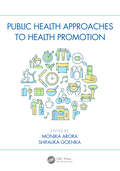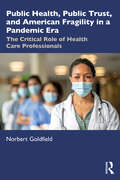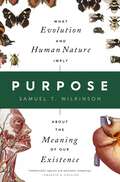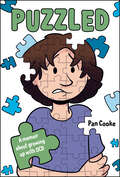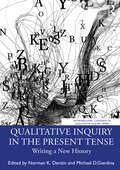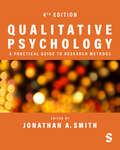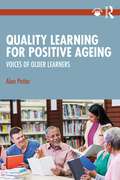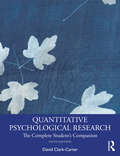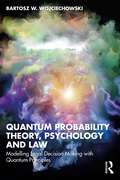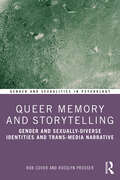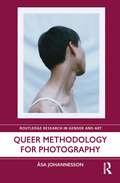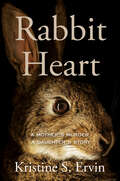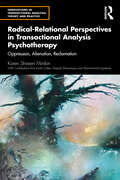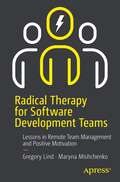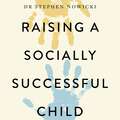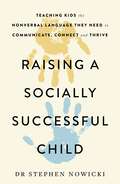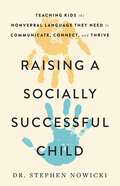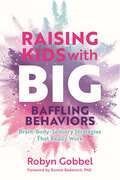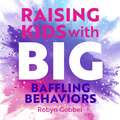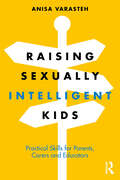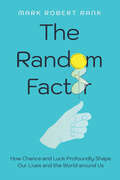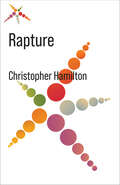- Table View
- List View
Public Health Approaches to Health Promotion (Public Health Approach)
by Monika Arora and Shifalika GoenkaHealthy behaviors, at the individual and community levels, are imperative to improving and sustaining better public health. With a strong focus on prevention, health promotion strategies are crucial to improving quality of life, while taking into account the various determinants of health. This book provides a global perspective, with an emphasis on contextual issues with health promotion in South Asia for understanding challenges and related strategies. Readers will be comprehensively introduced to healthy behaviors through case studies, covering theories, interventions, and approaches to promote healthy behavior, the impact of policy, and how behavior change can be sustained. Key features – • Covers existing and emerging issues in health promotion • Input from globally renowned public health experts with a multidisciplinary approach to content and audience • Connects with health systems and relevant sustainable development goals • Provides case studies for enabling readers to understand and apply evidence-based solutions to key public health issues
Public Health, Public Trust and American Fragility in a Pandemic Era: The Critical Role of Health Care Professionals
by Norbert GoldfieldThis book explores how professionals and policymakers in mental and physical health care can use lessons from the COVID pandemic to better inform future public policy and treatment. Using the United States as a test case, Norbert Goldfield draws on his professional experience in healthcare and policy-making to explore how some societies have emerged from the pandemic with increasing internal conflicts. The author uses excerpts from his own COVID diary to revisit key stages in the response to the COVID pandemic to highlight where division has entered the publish health discourse, and to set out an alternative vision of how mental and physical health can be framed professionally and publicly. In addition to this account, Dr Goldfield details how our political system should change with respect to pandemics and how health professionals, together with the lay public, can help. Specifically, the book highlights the three critical issues confronting American pandemic fragility: increasing vaccinations, decreasing misinformation, and fostering greater linkages between our public and acute health systems. This book will be invaluable for all types of health care professionals, both in mental and physical health arenas, lay people interested in the pandemic, and for policymakers.
Purpose: What Evolution and Human Nature Imply about the Meaning of Our Existence
by Samuel T. WilkinsonBy using principles from a variety of scientific disciplines, Yale Professor Samuel Wilkinson provides a framework for human evolution that reveals an overarching purpose to our existence. Generations have been taught that evolution implies there is no overarching purpose to our existence, that life has no fundamental meaning. We are merely the accumulation of tens of thousands of intricate molecular accidents. Some scientists take this logic one step further, suggesting that evolution is intrinsically atheistic and goes against the concept of God. But is this true? By integrating emerging principles from a variety of scientific disciplines—ranging from evolutionary biology to psychology—Yale Professor Samuel Wilkinson provides a framework of evolution that implies not only that there is an overarching purpose to our existence, but what this purpose is. With respect to our evolution, nature seems to have endowed us with competing dispositions, what Wilkinson calls the dual potential of human nature. We are pulled in different directions: selfishness and altruism, aggression and cooperation, lust and love. When we couple this with the observation that we possess a measure of free will, all this strongly implies there is a universal purpose to our existence. This purpose, at least one of them, is to choose between the good and evil impulses that nature has created within us. Our life is a test. This is a truth, as old as history it seems, that has been espoused by so many of the world&’s religions. From a certain framework, these aspects of human nature—including how evolution shaped us—are evidence for the existence of a God, not against it. Closely related to this is meaning. What is the meaning of life? Based on the scientific data, it would seem that one such meaning is to develop deep and abiding relationships. At least that is what most people report are the most meaningful aspects of their lives. This is a function of our evolution. It is how we were created.
Puzzled: A Memoir about Growing Up with OCD
by Pan CookeGrowing up with undiagnosed OCD sure isn&’t easy, and here Pan Cooke shares his own experiences with that condition in a graphic-novel memoir that is as funny as it is powerfully candid and openhearted.Pan Cooke is ten years old when anxious thoughts begin to take over his brain like pieces of an impossible puzzle. What if he blurts out a swear word while in church? What if he accidentally writes something mean in his classmate&’s get-well card? What if his friend&’s racy photo of a supermodel ends up in his own homework and is discovered by his teacher? More and more, he becomes hijacked by fears that can only be calmed through exhausting, time-consuming rituals.Pan has no way of knowing that this anxiety puzzle and the stressful attempts to solve it are evidence of a condition called Obsessive Compulsive Disorder. This is his story of living with and eventually learning about OCD. Told with endearing honesty and humor, Puzzled shows the reader the importance of empathy for oneself and those going through something they don&’t yet understand.
Qualitative Inquiry in the Present Tense: Writing a New History (International Congress of Qualitative Inquiry Series)
by Norman K. Denzin Michael D. GiardinaIn Qualitative Inquiry in the Present Tense, contributors engage with epistemological and philosophical questions concerning the conduct of qualitative inquiry in the present moment, and especially as it relates to various understandings of writing in/as inquiry.Topics addressed include methodological processes, questions of narrative uprootedness, relational inquiry, Indigenous ethico-onto-epistemologies, storytelling, and transformative writing forms and practices. This is a messy, often unruly collection (in the best way possible) of disparate ideas strung tightly together by literal and metaphorical questions of the research act of writing. Contributors from the United States, Australia, Canada, England, and Scotland imaginatively conceive of new qualitative futures—and how we might write ourselves there.This evocative new book is a must-read for faculty and students alike who are interested in and engaged with questions and ideas oriented toward understanding our current historical present in qualitative research—a moment in which the field is perpetually in motion or in flux, with new theories, methods, and orientations arising, competing, and even contradicting one another.
Qualitative Psychology: A Practical Guide to Research Methods
by Jonathan A. SmithUndertaking qualitative research in psychology can seem like a daunting and complex process, especially when it comes to selecting the most appropriate approach for your project. This book provides a comprehensive and practical introduction to the key approaches in qualitative psychology research from a world-leading group of academics and researchers. This Fourth Edition features timely updates that reflect the most current practice in the field. Jonathan A. Smith is Professor of Psychology at Birkbeck University of London.
Qualitative Psychology: A Practical Guide to Research Methods
by Jonathan A. SmithUndertaking qualitative research in psychology can seem like a daunting and complex process, especially when it comes to selecting the most appropriate approach for your project. This book provides a comprehensive and practical introduction to the key approaches in qualitative psychology research from a world-leading group of academics and researchers. This Fourth Edition features timely updates that reflect the most current practice in the field. Jonathan A. Smith is Professor of Psychology at Birkbeck University of London.
Quality Learning for Positive Ageing: Voices of Older Learners
by Alan PotterQuality Learning for Positive Ageing explores the views of older adult learners to understand the factors that contribute to ‘quality’ in later-life learning and how these relate to wellbeing, positive ageing, and gaining protection against cognitive decline.Through capturing and considering the viewpoints of learners, facilitators and learning organisations, the author outlines the specific characteristics of quality that they associate with informal learning and how it can be enhanced through the adoption of simple strategies. Key topics covered include the implications of an increasing ageing population and barriers to older people learning as well as the cognitive, mental wellbeing, health, and social benefits of learning in later life. Illustrated throughout with vignettes of real later-life learners, this thought-provoking text unpicks how learners can maximise the benefits of learning in later life for themselves, how tutors can create learning opportunities that embody the characteristics of quality for them, and how providers can offer an environment that simply allows quality learning to flourish.This accessible and comprehensive text will be of great interest to researchers of gerontology and ageing, educational gerontology, adult education, and lifelong learning as well as those engaged in dementia research.
Quantitative Psychological Research: The Complete Student's Companion
by David Clark-CarterQuantitative Psychological Research: The Complete Student's Companion, expertly guides the reader through all the stages involved in undertaking quantitative psychological research: designing a study, choosing a sample of people, undertaking the study, analysing the data, and reporting the research. Accessibly written and clearly presented, the book is designed for anyone learning to conduct quantitative psychological research as well being a reference work for professional psychologists. It covers the full research process, from the original idea to reporting the completed study, emphasizing the importance of looking beyond statistical significance in evaluating data. The book provides step-by-step guidance on choosing, interpreting and reporting the appropriate analysis, featuring worked examples and extended calculations as appendices for readers who wish to delve further. This edition features a new chapter examining ideas on how causality might be identified when data is not obtained from an experiment and has been thoroughly updated throughout to reflect latest research practices. Care has been taken to avoid tying the book to any specific statistical software, providing readers with a thorough grounding in the basics no matter which package they go on to use.This is a must read for professional psychologists as well as students and researchers of Psychology, Statistics and Research Methods. This book is also invaluable for anyone interested in conducting quantitative psychological research.
Quantitative Psychological Research: The Complete Student's Companion
by David Clark-CarterQuantitative Psychological Research: The Complete Student's Companion, expertly guides the reader through all the stages involved in undertaking quantitative psychological research: designing a study, choosing a sample of people, undertaking the study, analysing the data, and reporting the research.Accessibly written and clearly presented, the book is designed for anyone learning to conduct quantitative psychological research as well being a reference work for professional psychologists. It covers the full research process, from the original idea to reporting the completed study, emphasizing the importance of looking beyond statistical significance in evaluating data. The book provides step-by-step guidance on choosing, interpreting and reporting the appropriate analysis, featuring worked examples and extended calculations as appendices for readers who wish to delve further.This edition features a new chapter examining ideas on how causality might be identified when data is not obtained from an experiment and has been thoroughly updated throughout to reflect latest research practices. Care has been taken to avoid tying the book to any specific statistical software, providing readers with a thorough grounding in the basics no matter which package they go on to use.This is a must read for professional psychologists as well as students and researchers of Psychology, Statistics and Research Methods. This book is also invaluable for anyone interested in conducting quantitative psychological research.
Quantum Probability Theory, Psychology and Law: Modelling Legal Decision Making with Quantum Principles
by Bartosz W. WojciechowskiThis book provides the first consideration of quantum principles in legal decision making. It shows how quantum probability theory can be applied to psychology and law to deepen our understanding of psychological and legal issues, suggesting a paradigm shift in the study of these areas. Written as an introduction to quantum probability theory for non-physicists, the book offers an accessible summary of how psychology can be applied to quantum phenomena for human decision making. It introduces psychologists and lawyers to fresh conceptual frameworks, including classical probability theory, classical statistics, data mining and quantum theory. Wojciechowski shows how quantum theory and concepts can be transferred to psychological research models, and can help to resolve previously unexplained psychological phenomena, influence scientific views, undermine traditional foundations of the legal system and result in the development of new research directions. Studies conducted by the author are used to show how problems facing legal decision making can be addressed in a completely new light with the application of quantum probability theory. This cutting-edge and innovative book will be of great interest to graduate students and researchers in the fields of forensic psychology and legal decision making, as well as legal professionals and legal scholars.
Queer Memory and Storytelling: Gender and Sexually-Diverse Identities and Trans-Media Narrative (Gender and Sexualities in Psychology)
by Rob Cover Rosslyn ProsserQueer Memory and Storytelling unpacks the ways in which the narrative practices of recounting past experiences play a formative role in formation of identities, cultures, and social change among gender and sexually diverse individuals. Grounded in theoretical research, this work delves into historical accounts, case studies, and draws from the rich tapestry of interviews conducted during extensive LGBTQ+ research studies. It explores the power of memorial storytelling to shape the narratives surrounding gender and sexual diversity, offering profound insights into the role storytelling plays as a deeply subjective, personal, communal, and cultural form of expression. The book introduces a queer perspective that reframes the study of narrative psychology, community history, philosophies of subjectivity and the socio-cultural heritage of LGBTQ+ minority communities. It also focuses on the pivotal role played by memory and reflection found within online coming-up stories and contemporary modes of shared community memorialization. By employing queer theory, ethnographic research, interviews and meticulous media/textual analysis, the book presents new frameworks for comprehending the myriad facets of identity, and investigating what it means to remember and narrate selfhood in the context of social life, actively ‘queering’ the concept of memory. Queer Memory and Storytelling will appeal to academics, researchers and students in psychology, sociology, gender and sexuality studies, and communication.
Queer Memory and Storytelling: Gender and Sexually-Diverse Identities and Trans-Media Narrative (Gender and Sexualities in Psychology)
by Rob Cover Rosslyn ProsserQueer Memory and Storytelling unpacks the ways in which the narrative practices of recounting past experiences play a formative role in formation of identities, cultures, and social change among gender and sexually diverse individuals.Grounded in theoretical research, this work delves into historical accounts, case studies, and draws from the rich tapestry of interviews conducted during extensive LGBTQ+ research studies. It explores the power of memorial storytelling to shape the narratives surrounding gender and sexual diversity, offering profound insights into the role storytelling plays as a deeply subjective, personal, communal, and cultural form of expression. The book introduces a queer perspective that reframes the study of narrative psychology, community history, philosophies of subjectivity and the socio-cultural heritage of LGBTQ+ minority communities. It also focuses on the pivotal role played by memory and reflection found within online coming-up stories and contemporary modes of shared community memorialization. By employing queer theory, ethnographic research, interviews and meticulous media/textual analysis, the book presents new frameworks for comprehending the myriad facets of identity, and investigating what it means to remember and narrate selfhood in the context of social life, actively ‘queering’ the concept of memory.Queer Memory and Storytelling will appeal to academics, researchers and students in psychology, sociology, gender and sexuality studies, and communication.
Queer Methodology for Photography (Routledge Research in Gender and Art)
by Asa JohannessonThis book presents new ways of approaching photographic discourse from a queer perspective, offering discussions on what a queering methodology for photography may entail by drawing links between artistic strategies in photographic practice and key theoretical concepts from photography theory, queer theory, critical theory, and philosophy. With different examples of conceptual perspectives, including representation, formalism, and mediumlessness, it seeks to diversify queer methodology for photography. While primarily addressing photography, this book is entwined with broader philosophical questions concerning identity, difference, and the creations of systems of thought that limit the possibilities of existence to binary categorisation. It proposes a new concept of the photographic image that addresses its materiality, in the form of the poetic and the political, in relationship to a generative principle that is named as a queer quality: the photograph’s ability to voice queer concerns also beyond its role as representation. This book will be of interest to scholars working in photography, art history, queer studies, new materialism, and posthumanism.
Rabbit Heart: A Mother's Murder, a Daughter's Story
by Kristine S. ErvinA Washington Post &“Most Anticipated&” Book of the Year • A New York Times &“Must Read&”For readers of My Dark Places and The Fact of a Body, a beautiful, brutal memoir documenting one woman&’s search for identity alongside her family's decades-long quest to identify the two men who abducted—and murdered—her mother"Melding true crime with memoir, Ervin reminds us of what happens when we conflate people with the transgressions committed against them—the collateral damage we inflict when we turn human beings into moral allegory . . . A powerful treatise on love and loss, on mothers and daughters, but it is also a warning to all of us who consume true crime." —The New York Times Book ReviewKristine S. Ervin was just eight years old when her mother, Kathy Sue Engle, was abducted from an Oklahoma mall parking lot and violently murdered in an oil field. First, there was grief. Then the desire to know: what happened to her, what she felt in her last terrible moments, and all she was before these acts of violence defined her life.In her mother&’s absence, Ervin tries to reconstruct a woman she can never fully grasp—from her own memory, from letters she uncovers, and from the stories of other family members. As more information about her mother's death comes to light, Ervin&’s drive to know her mother only intensifies, winding into her own fraught adolescence. She reckons with contradictions of what a woman is allowed to be—a self beyond the roles of wife, mother, daughter, victim—what a &“true&” victim is supposed to look like, and, finally, how complicated and elusive justice can be.Told fearlessly and poetically, Rabbit Heart weaves together themes of power, gender, and justice into a manifesto of grief and reclamation: our stories do not need to be simple to be true, and there is power in the telling.
Radical-Relational Perspectives in Transactional Analysis Psychotherapy: Oppression, Alienation, Reclamation (Innovations in Transactional Analysis: Theory and Practice)
by Karen Shireen MinikinRadical-Relational Perspectives in Transactional Analysis Psychotherapy assesses various forms of oppression in current, historical and personal perspectives and considers the impact this has on the development and sustenance of the psyche. Within this book, Minikin reformulates the ideas of Radical Psychiatry for the contemporary community, and both honours the historical legacy of including the social and political in transactional analysis and offers a critique of Eurocentrism in traditional relational perspectives. Through personal and clinical illustrations, Minikin encourages those in the TA community to move topics such as diversity from the margins to the centre when working with patients, and to integrate the political with traditional relational perspectives. The consequences of becoming marginalized through alienation speaks across multiple disciplines in social sciences, making this a must-read for counsellors, psychotherapists and other applied psychologists who want to think more deeply about social responsibility within their work.
Radical Therapy for Software Development Teams: Lessons in Remote Team Management and Positive Motivation
by Gregory Lind Maryna MishchenkoBuild and maintain effective, collaborative, and motivated software development teams. This book addresses the challenges in doing so, like communication gaps, trust issues, and motivation problems, and provides strategies to overcome them. You'll be introduced to the Radical Therapy Dev philosophy, a holistic approach designed to optimize software development teams for better performance and overall well-being. This book highlights common pain points in software development and offers solutions to resolving much of the issues in teams. It offers strategies for implementation, focusing on adaptability and accountability, while also promoting community-supported standards. And, the book reveals why an emphasis on fostering a growth mindset, mentorship programs, and junior-intern initiatives promotes continuous learning and collaboration.With the rise of remote work, you'll see why hiring globally while thinking locally is gaining popularity. You'll also gain insights into removing barriers to remote work, along with tools and policies for remote collaboration. Additionally, the book explores the concept of cloud-native software development and its benefits. Radical Therapy for Software Development Teams critiques the traditional "agile" methodology, identifying its shortcomings while extracting valuable lessons that can still be applied effectively. What You Will LearnAddress communication gaps, foster trust, and nurture a growth mindset among team membersAvoid common feedback mistakes, recognize accomplishments, and implement a reward systemImprove software development practices and team dynamics Take a scientific approach to project management rather than traditional requirements gatheringBreak Down Communication BarriersWho This Book is ForSoftware development professionals
Raising a Socially Successful Child
by Dr NowickiWe all want our to children to learn the social skills they need to thrive. Yet many kids are struggling to connect, often with no apparent reason why. What with the steep rise in screen time and the social learning lost to Covid quarantines and school closures, many kids haven't had sufficient opportunity to learn all the rules of nonverbal behaviour.In Raising a Socially Successful Child, Dr. Stephen Nowicki reveals how to identify the non-verbal areas where a child might be struggling, and equips readers with a set of simple exercises for helping any child learn how to:- Follow the rhythm of conversations- Respect the boundaries of personal space- Learn to express and read emotions in facial expressions and body language- Understand the difference between appropriate and inappropriate touch- Sense a person's mood based on their tone of voiceDrawing on decades of research, as well as dozens of case studies, Raising a Socially Successful Child is a much-needed, practical guide to helping children master the non-verbal skills they need to succeed in life.
Raising a Socially Successful Child
by Dr NowickiWe all want our to children to learn the social skills they need to thrive. Yet many kids are struggling to connect, often with no apparent reason why. What with the steep rise in screen time and the social learning lost to Covid quarantines and school closures, many kids haven't had sufficient opportunity to learn all the rules of nonverbal behaviour.In Raising a Socially Successful Child, Dr. Stephen Nowicki reveals how to identify the non-verbal areas where a child might be struggling, and equips readers with a set of simple exercises for helping any child learn how to:- Follow the rhythm of conversations- Respect the boundaries of personal space- Learn to express and read emotions in facial expressions and body language- Understand the difference between appropriate and inappropriate touch- Sense a person's mood based on their tone of voiceDrawing on decades of research, as well as dozens of case studies, Raising a Socially Successful Child is a much-needed, practical guide to helping children master the non-verbal skills they need to succeed in life.
Raising a Socially Successful Child: Teaching Kids the Nonverbal Language They Need to Communicate, Connect, and Thrive
by Dr. Stephen Nowicki&“A brilliant…and perfectly timed&” (William Stixrud, co-author of The Self-Driven Child) book showing how parents and educators can help children master the nonverbal language of social connection and success We all want our kids learn the social skills they need to thrive. Yet many of today&’s kids are struggling to connect, often with no apparent reason why. In most cases, the explanation is simple: a child hasn&’t fully mastered the nonverbal language of everyday social interaction, like how to take turns in a conversation, how to respect boundaries of personal space, or how to tell whether a friend is feeling happy or sad. And yet, children aren&’t taught nonverbal skills in the same formalized way they are taught reading and writing. Instead, they are expected to absorb these skills at school, home, and on the playground. But between the steep rise in screen time and the social learning lost to Covid quarantines and school closures, today&’s kids have had fewer opportunities to learn the rules of nonverbal behavior. Fortunately, parents and teachers can help kids shore up these essential skills. In Raising a Socially Successful Child, Dr. Stephen Nowicki reveals how to identify the nonverbal areas where a child might be struggling, and equips readers with a set of simple exercises to help any child learn how to: Follow the rhythm of conversations Express and read emotions in facial expressions and body language Understand the difference between appropriate and inappropriate touch Sense a person&’s mood based on their tone of voice And more Drawing on decades of research, as well as dozens of stories from across the country, Raising a Socially Successful Child is the practical guide to helping children master the nonverbal skills they need to succeed in childhood, and their adult lives.
Raising Kids with Big, Baffling Behaviors: Brain-Body-Sensory Strategies That Really Work
by Robyn Gobbel"All behavior makes sense"'"It most certainly does not!", is probably your first reaction.Parenting and neuroscience expert Robyn Gobbel is here to reveal how all behavior, no matter how baffling, can be explained and remedied. You just need to look past the behavior and understand what's going on inside.Robyn decodes the latest brain science into easy-to-understand principles and metaphors to help you become an expert in your child's behavior. She reveals simple ways to help you regulate and connect with your child, with brain-, body- and sensory-based strategies to overcome day-to-day challenges. She also provides you with the knowledge to understand and regulate your own brain so that you don't flip your lid when your child flips theirs.Let this be your lifeline for parenting or caring for any child with baffling behaviors and hidden challenges, including kids who have experienced adversity, or with additional needs.
Raising Kids with Big, Baffling Behaviors: Brain-Body-Sensory Strategies That Really Work
by Robyn Gobbel"All behavior makes sense"'"It most certainly does not!", is probably your first reaction.Parenting and neuroscience expert Robyn Gobbel is here to reveal how all behavior, no matter how baffling, can be explained and remedied. You just need to look past the behavior and understand what's going on inside.Robyn decodes the latest brain science into easy-to-understand principles and metaphors to help you become an expert in your child's behavior. She reveals simple ways to help you regulate and connect with your child, with brain-, body- and sensory-based strategies to overcome day-to-day challenges. She also provides you with the knowledge to understand and regulate your own brain so that you don't flip your lid when your child flips theirs.Let this be your lifeline for parenting or caring for any child with baffling behaviors and hidden challenges, including kids who have experienced adversity, or with additional needs.
Raising Sexually Intelligent Kids: Practical Skills for Parents, Carers and Educators
by Anisa VarastehMany parents feel uncomfortable with the thought of having ‘the talk’ with their children, especially teenagers. But what many people don’t realise is how much of sexuality education has nothing to do with sex itself. In this book, Clinical Sexologist Anisa Varasteh teaches the foundations of a comprehensive sexuality education for children and teenagers and answers the most common questions young people have about sex and sexuality. Contrary to popular belief, talking about sex and sexuality does not make young people more prone to sexual experimentation. This book provides research-based evidence for how a comprehensive sexuality education is important for children’s safety, psychological and physical wellbeing. It identifies the barriers to having open conversations with children and teenagers, and outlines methods for how to overcome them. With a focus on skills, the book addresses the building blocks of sexuality education and how to develop an environment of mutual trust, it outlines key topics for discussion and the skills that children need to develop to make healthy decisions about their sexuality. Complete with practical support, including over 20 worksheets and a comprehensive list of tough questions from teenagers – and suggestions for how to address them – this book is an essential resource for parents, carers and educators who are responsible for the health, safety and development of children and teenagers.
The Random Factor: How Chance and Luck Profoundly Shape Our Lives and the World around Us
by Prof. Mark Robert RankUpending notions of predictability and rugged individualism to reveal how truly random the world is. It’s comforting to think that we can be successful because we work hard, climb ladders, and get what we deserve, but each of us has been profoundly touched by randomness. Chance is shown to play a crucial role in shaping outcomes across history, throughout the natural world, and in our everyday lives. In The Random Factor, Mark Robert Rank draws from a wealth of evidence, including interviews and research, to explain how luck and chance play out and reveals how we can use these lessons to guide our personal lives and public policies. The Random Factor traverses luck from macro to micro, from events like the Cuban Missile Crisis to our personal encounters and relationships. From his perspective as a scholar of poverty, Rank also delves into the class and race dynamics of chance, emphasizing the stark disparities it brings to light. This transformative book prompts a new understanding of the twists and turns in our daily lives and encourages readers to fully appreciate the surprising world of randomness in which we live.
Rapture (No Limits)
by Christopher HamiltonWhat is it like to experience rapture? For philosopher Christopher Hamilton, it is a loss of self that is also a return to self—an overflowing and emptying out of the self that also nourishes and fills the self. In this inviting book, he reflects on the nature of rapture and its crucial yet unacknowledged place in our lives.Hamilton explores moments of rapture in everyday existence and aesthetic experience, tracing its disruptive power and illuminating its philosophical significance. Rapture is found in sexual love and other forms of intense physical experience, such as Philippe Petit’s nerve-defying wire walk between the Twin Towers. Hamilton also locates it in quieter but equally joyous moments, such as contemplating a work of art or the natural world. He considers a range of examples in philosophy and culture—Nietzsche and Weil, Woolf and Chekhov, the extremes of experience in Werner Herzog’s films—as well as aspects of ordinary life, from illness to gardening. Conversational and evocative, this book calls on us to ask how we might make ourselves more open to experiences of rapturous joy and freedom.
